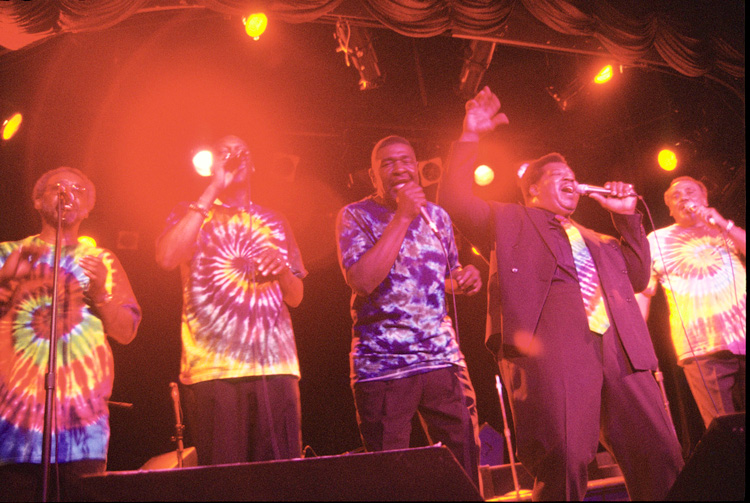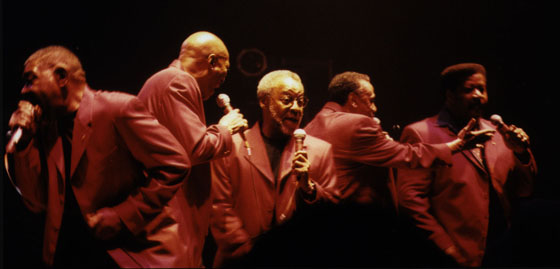The Persuasions in the pulpit: (from left) Jayotis Washington, B.J. Jones, Sweet Joe Russell, Jerry Lawson, Jimmy Hayes. (Photo: Susanna Millman)RAISING THE DEAD
Re-tooled and revised, The Persuasions’ investigation of Grateful Dead songs is the spiritual album of the year.
By David McGee
PERSUASIONS OF THE DEAD
THE PERSUASIONS & FRIENDS: THE GRATEFUL DEAD SESSIONS
The Persuasions
Zoho RootsBrothers and sisters, let us not embroil ourselves in senseless debate about whether the Persuasions’ 2000 long player, Might As Well…The Persuasions Sing Grateful Dead, was one of the best albums of that end-of-millennium year, if indeed it was not the best. To quote the outsider artist Rodney King, “Can’t we all just get along?” Amen.
Now that the point has been conceded, let us humble ourselves before the altar of a new Persuasions album I hereby decree to be twice as good as the original Grateful Dead tribute, namely Persuasions of the Dead, a revisiting of Might As Well with a few notable addendums in the form of: six new songs, six new guest artists, remixed, remastered, reconsidered, restructured and, not least of all, containing a one-song reunion—quite possibly the last, owing to factors of health, not compatibility—of original Persuasions Jerry Lawson, Jayotis Washington and Sweet Joe Russell, along with more recent addition Raymond Sanders, on a new track, “Stella Blue,” which features an exalted, poignant solo on the ancient Chinese stringed erhu by Dingmong Qiao, then a Santa Monica street musician after emigrating from his native land where he had been a child prodigy who fell under the boot of the Cultural Revolution. (Lawson also helped producer Rip Rense—the man responsible for steering the group’s other 2000 gem, Frankly A Cappella: The Persuasions Sing Zappa—retool the original album into what we hear now). A Persuasions fan doubtless familiar to readers of this publication, one Tom Waits, suggested the album title. To extend the concept, Rense has divided the songs into two Dead-like sets on two discs, one reason why this iteration is twice as good as the original. The result is not merely an exceptional album turned into a great album, but hands down the spiritual event-in-song of 2011.
Highlights from the first set of the new Persuasions of the Dead album, produced by Rip Rense. Video courtesy Rip Rense.
Highlights from the second set of the Persuasions of the Dead album, produced by Rip Rense. Video courtesy Rip Rense.That this should be so will not surprise Persuasions followers accustomed to the group finding a higher calling in the most unexpected places. It’s one thing to turn the Everlys’ “Dream” into an epic of spiritual yearning, but quite another to fashion the Partridge Family’s “I Woke Up In Love This Morning” into a gospel house wrecker, as they did. Consistently throughout the Jerry Lawson era (1970 until 2002, when the towering lead singer went on his own) the group articulated appeals to a higher power otherwise tucked inside or masked as more worldly pursuits in secular fare, although gospel informed their every sung note. (They did finally record a gospel album, in 2000’s moving Sunday Morning Soul for the Bullseye Blues label.) The Persuasions always had their hands on the gospel wheel whether they were singing Thomas A. Dorsey, Lennon-McCartney or, on one memorable occasion I was party to, Bobby Moore: back in ’76 I accompanied the group to a show they performed for inmates in the exercise yard of Rahway State Prison in New Jersey, and got observe up close and personal how hard they were working (a cappella, of course) to move on up a little higher. They made it to the mountaintop, more than once, but especially on the final, amazing number, “Searching for My Baby” (a Top 30 single for Bobby Moore & the Rhythm Aces as “Searching For My Love” in 1966, a demo of the song landed the Persuasions their first record deal, with Frank Zappa’s label in 1970 and is featured on their first album, Acappella). For this occasion they supplanted their usual hand-clapping, foot stomping arrangement with one more tortured and deliberate, transforming it into a gut wrenching, festering wound of a confession by a man bereft of hope and pleading for the hand of providence to rescue him from self-inflicted despair. In my mind’s eye I can still see Lawson stepping out in front of the group and raising one arm heavenward, his head tilted back, sweat pouring off him like a waterfall, his voice ascending in a gritty, gravelly wail. Before him the prisoners stood transfixed, close enough to touch the hem of his garment but standing stark still, some with tears flowing down their cheeks. There must have been applause when Lawson and the fellows finished, but mostly I remember an eerie stillness, as if the Word had steamrolled the inmates, its force rendering them momentarily mute. (I also remember a relieved Jerry Lawson climbing into the limo afterwards and exhaling loudly. “I didn’t know the prisoners were gonna be that close,” he said, prompting laughs all around.)
The Persuasions live. (Photo: Valerie Ramos Ford)For this expanded Dead tribute the quartet went back to the same rich well it had drawn from in 2000, namely the songs of Robert Hunter, all but four of the 20 tracks being his co-writes with Jerry Garcia (two are traditional numbers arranged by Lawson and Rense, and Rense and Persuasion Dave Revels, whereas a third song is a Hunter-Bob Weir co-write, with the stunning, recondite ballad “It Must Have Been the Rose” being a Hunter copyright alone). No matter the co-writes, specifically we are talking about Hunter’s complex, even labyrinthine, lyrics, whose deep spirituality insinuated itself into songs centered on characters in search of a plot, if you will, seekers on the road to enlightenment and self-sufficiency, knowing full well they are being guided by forces greater than their own will even as they struggle to assert that will. The Persuasions simply eat up these conflicts—they understand them, they’ve lived them, they’ve battled with their ambiguities on the road to the fount of wisdom, the source of love and the peace that passes all understanding.
So it is no surprise to hear the Persuasions turn those magnificent collective voices to the exalted challenge of Robert Hunter’s lyrics; to hear them urge, in the rhythmically charged “Liberty,” “walk this world where you born to cry…oohh, freedom, liberty…leave me alone to find my own way home”—struggling to break through the a priori sorrow of life to a place where they can feel in command of their own destinies; to hear Lawson’s throaty, emotional reading of one of Hunter’s most compelling songs, “It Must Have Been the Roses,” with the fellows supporting him in solemn, hymn-like harmony and Pete Grant adding delicate dobro filigrees to enhance the tender but melancholy atmosphere of a song in which Lawson’s narrator may be mourning the death of his beloved Annie, who lays her head on the roses and seemingly never arises again, the rose being a flower with deep symbolism to the Dead and in the history of Christian art, and of which Robert Hunter himself has said, “The rose is the most prominent image in the human brain, as to delicacy, beauty, short-livedness, thorniness. It's a whole. There is no better allegory for, dare I say it, life, than roses."
More highlights from Persuasions of the Dead: the complete versions of ‘Ripple’ and ‘Bertha’ (‘test me, test me!’) from Set One.It may well be that no single Dead album ever rose to the level of spirituality the Persuasions achieve on Persuasions of the Dead, but then the Persuasions had a deep catalogue from which to choose and free reign to make of this project what they would. They chose, of course, substance, in songs rich in symbolism and freighted with extra-musical meaning and references. “New Speedway Boogie,” a bluesy, persistent grind, is rife with ambiguity in expressing a lament for a world enveloped in darkness, in which rich and poor alike are bedeviled, even as the singer harbors hope of all the burdens being lifted. On the other hand, Dead fans and scholars have theorized it being a parable centered on the Rolling Stones’ tragic Altamont Speedway concert (citing the lyric “In the heat of the sun a man died of cold,” as well as Hunter’s own note on his 1991 album A Box of Rain in which he says the song was “written as a reply to an indictment of the Altamont affair by pioneer rock critic Ralph J. Gleason,” which pretty much seals the deal on that point) and others have claimed its lyrics reference works as varied as Stephen Foster’s “Oh Susanna,” the gospel standard “Swing Low, Sweet Chariot” and Geoffrey Chaucer's "Troilus and Criseyde," from 1385. You want to parse Robert Hunter’s lyrics you better have your stuff wrapped tight.
Vintage Persuasions performing a gospel medley on New Jersey public television: ‘When Jesus Comes,’ with Sweet Joe Russell on lead, and ‘People Get Ready,’ with Jerry Lawson on lead.So there is no casual symbolism or thoughtless wordplay here. The Persuasions are engaged in plumbing a dark night of the soul for evidence of the soul’s salvation. The manifold references to the healing power of water say much about the heightened aim of the group’s art here: water is the dominant image in “Ripple” (“…ripple in still waters/when there is no pebble tossed/no wind to blow…”), this treatment a beautiful, close harmonized arrangement enhanced by Pete Grant’s music box-like chimes on dobro, counsels “reach out your hand, if your cup is empty…there was a fountain that was not made by the hands of man…”; “Brokedown Palace,” an a cappella performance as tender, sweet and soulful as any the Persuasions have ever recorded, close harmonized with pronounced bass punctuations like something out of the Ravens’ playbook, chronicles a man’s broken heart in terms at once physical and metaphysical, sometimes in the same lyric, with water once again serving as a healing salve, to wit, “in a bed, in a bed by the waterside, I will lay my head/listen to the river sing sweet songs/to rock my soul…”
Whereas you can get lost in the beauty of Country Joe McDonald’s lonely, crying blues harp in the somber, hymn-like take on “Sugaree,” you can also hear something of what I heard that day in the Rahway Prison exercise yard in “Greatest Story Ever Told,” less an ambiguous than a fanciful Biblical tale delivered with a hand clapping, foot stomping rhythmic thrust, four-part harmonies, a burbling bass vocal, an anxious, jangling tambourine supporting a clear, bright tenor vocal by Jayotis with Jerry rising up to shout “Lord have mercy!” and “hallelujah!” in between Sweet Joe’s falsetto wails, all pushing Jayotis to a more fevered performance as the song unfolds, until the whole thing explodes with the fury of, yes, mighty waters. On “Bertha,” with Vince Welnick on piano and backing vocals courtesy the plaintive voices of Jackie LaBranch and Gloria Jones, many hands clapping, a steady vocal riff of “doot-doot-do-doot-doot,” Lawson’s fiery lead vocal plants the proceedings solidly in the old country church as he sings fervently “on bended knees” for a no-good woman to leave him alone. At his most desperate we hear him dare/plead to his antagonist, “test me, test me!”
Mark you this: tested time and again on Persuasions of the Dead, Jerry Lawson, Sweet Joe Russell, Jayotis Washington and Raymond Sanders prove worthy, and emerge consecrated. Accept their hymn of invitation and you too shall be released. God bless the Persuasions.
The Persuasions’ Persuasions of the Dead is available at www.amazon.com
Founder/Publisher/Editor: David McGee
Contributing Editors: Billy Altman, Laura Fissinger, Christopher Hill, Derk Richardson
Logo Design: John Mendelsohn (www.johnmendelsohn.com)
Website Design: Kieran McGee (www.kieranmcgee.com)
Staff Photographers: Audrey Harrod (Louisville, KY; www.flickr.com/audreyharrod), Alicia Zappier (New York)
E-mail: thebluegrassspecial@gmail.com
Mailing Address: David McGee, 201 W. 85 St.—5B, New York, NY 10024




